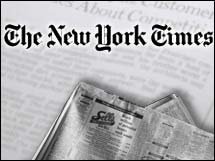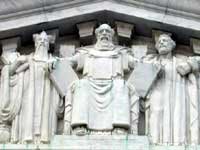
Todd Zywicki has a great post over at the Volokh Conspiracy. Here is a major excerpt:
New York Times Hypothesis:
Awhile back, around the time of Lawrence and Grutter in particular, the hypothesis was floated--mainly in jest, I assume--that the best predictor of Surpreme Court outcomes in many socially and politically controversial cases was the conventional wisdom of America's political and legal elite. And that this consensus could be captured in an operative variable as being the expressed position of the New York Times Editorial Board (perhaps the Washington Post Editorial Board as well).
The Court's ruling in Kelo got me thinking about this hypothesis again, and so I went back and looked at the New York Times Editorials in three recent cases that came to mind as perhaps the most obvious tests of the hypothesis--Kelo, Raich, and Granholm. Sure enough, traditional legal variables seem to do fairly poorly in predicting the results in those cases, as many have noted. The composition of the majorities and minorities are all over the place with little consistency.
But one variable does hit the mark three out of three times--in each case, the Supreme Court ruling met with the approval of the New York Times Editorial Page. Moreover, Kennedy--who has typically been characterized by critics as being the most susceptible to being swayed by elite opinion--voted with the Times, I mean the majority, in each of the three cases (by my calculation, he was the only one who did so).
In addition to Lawrence and Grutter, of course, the New York Times variable also accurately predicted the outcome in the Campaign Finance Reform case. I haven't double-checked whether Kennedy voted with the majority in each of those three as well.To the best of my knowledge, no one has ever taken the "New York Times Hypothesis" seriously enough to test it empirically, but at first glance at least, it looks like it has some pretty good predictive power. If someone has run regressions on this, obviously I would be interested in the results.
Justices just want love--from people in power. So they do what it takes to earn that love.



